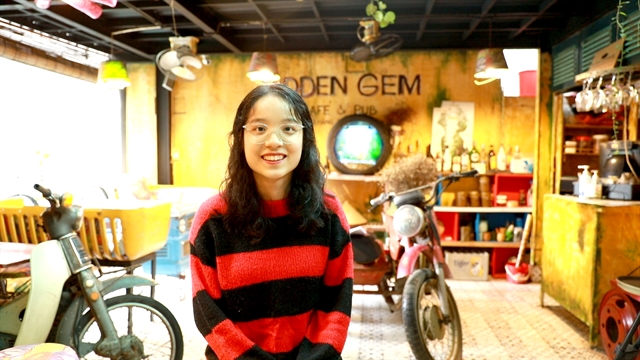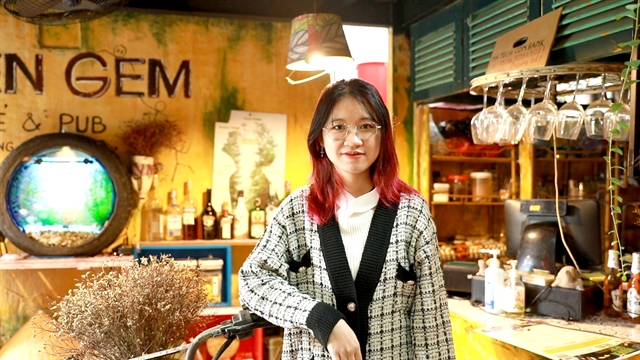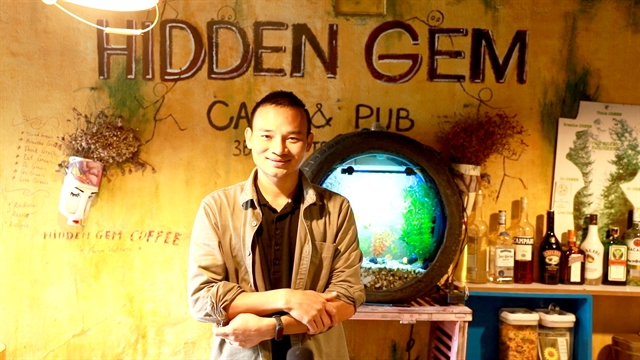 Society
Society

As the 26th UN Climate Change Conference of the Parties (COP26) continues in Glasgow, the United Kingdom, Việt Nam News reporters Vân Nguyễn, Minh Phương and Việt Dũng spoke to local people about their environmental concerns, expectations for the future, and what actions people can take to make Việt Nam more environmentally-friendly.
As the 26th UN Climate Change Conference of the Parties (COP26) continues in Glasgow, United Kingdom, Việt Nam News reporters Vân Nguyễn, Minh Phương and Việt Dũng spoke to local people about their environmental concerns, expectations for the future, and what actions people can take to make Việt Nam more environmentally-friendly.

|
| Nguyễn Linh Chi, second-year student, Foreign Trade University. VNS Photos |
Nguyễn Linh Chi, second-year student, Foreign Trade University
Climate change is a pressing issue. The frequency of natural disasters including bushfires and floods in Australia in 2019, and the heavy rain in Việt Nam in recent days, can be a sign of consequences caused by climate change. As far as I know, our country depends much on nature.
Việt Nam's agricultural activities rely much on the environment. Therefore, if there is any change, our economy will be affected. Educating young people is the key to raising awareness about climate change. When they grow up, they would not drop litter or do anything to the detriment of the environment.
Environmental issues should be taught more at schools. Currently, curricula are academically skewed towards mathematics or literature, and climate change is neglected, so few youngsters are aware of the problem. I’m well-informed about the problem because I’ve been exposed to the internet from a young age. Those who cannot access the internet should be taught about climate change at schools. I go to college on foot, by bicycle, or by bus at least once a week to reduce emissions. I think we should also cut back on plastic and nylon bags, and use more environmentally-friendly products like paper straws.

|
| Lê Thảo Nguyên, second-year student, Việt Nam National University of Agriculture. |
Lê Thảo Nguyên, second-year student, Việt Nam National University of Agriculture
Việt Nam’s economy still depends heavily on agriculture. Climate change can lead to harvest loss and increase the price of products. As we have seen, the price of vegetables has gone up recently. Unpredictable changes in weather also have a big impact on people’s health and daily lives. People in the central region of Việt Nam are the most vulnerable to natural disasters. Many have lost their homes and even their relatives. That is a huge loss for them.
I think the simplest action that everyone can take is to sort garbage. Many families in Việt Nam don’t know how to sort garbage properly to recycle plastic and daily waste. They just mix everything together, put it in a bag, and throw away or dump into a garbage truck. Obviously, a garbage truck cannot sort everything.
A plastic straw or cup takes hundreds of years to decompose, whereas a paper one can easily decay into compost which does no harm to the environment whatsoever. Such a change in consumer behaviour is tantamount to a change in transportation modes from bus to walking, which is good for health and reduces the greenhouse effect.
Young people are the future of a nation so it is important to educate them about the environment. Currently, geography is the only subject that covers topics of climate change. Unfortunately, most students view the subject as unimportant compared to others like mathematics, physics or English. We need to develop an independent subject just for environmental issues. Correct understanding will lead to correct actions.

|
| Nguyễn Văn Thơ, owner of Hidden Gem Café, Hà Nội. |
Nguyễn Văn Thơ, owner of Hidden Gem Café, Hà Nội
The consequences of climate change are unpredictable. There are impacts that we can feel right now and some are forecast to happen in the future but they will be all severe.
Việt Nam has a long coastal line, rising sea levels will cause salinity in inland areas, making it impossible to do agricultural activities. This is a big issue.
Normally, there are eight to 10 typhoons a year in Việt Nam. With climate change the intensity and frequency will be more severe, I don’t know we are going to handle this.
Education on climate change is very important. It is important young generations are well aware of environmental protection and interested in the environment.
In my homestay in Sapa, I apply classifying disposable and nondisposable garbage, using recyclable garbage as fertiliser. When I go shopping, I take my own reusable bags. There are certain things that we can’t get rid of. But it’s better if we have a container to store daily items like drinks, vegetables and meat. By doing this, I can cut about 80-90 per cent of plastic bags a day.
Bắc Ninh, my hometown, is terribly polluted. Every time I go jogging, my face is covered in pollutants. There is one rubbish tip every 1km along the dike near my house. Hà Nội is at least 20 times better than my hometown. In my hometown, there is no fund allocated to garbage collecting, so people just dump their garbage into fields. Each village has a heavily-contaminated dump. I hope that garbage in every district and province will be collected and treated properly. Currently, in many places, people just burn or bury garbage.
Integrating climate change into the curriculum is a good idea. We should link classroom knowledge with real-world practice like asking students to pick up trash outdoors. VNS




